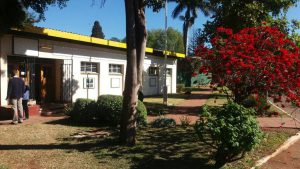Authorities must stop the decimation of Bvumba
March 3, 2013 in Opinion
The word “Bvumba” is derived from the eastern vernacular mubvumbi, meaning
persistent light showers that come with thick mist engulfing an area and its
surroundings.
Sunday Opinion by Farai Matebvu
The favourable climatic conditions and altitude allow a variety of animals
and different plant species to thrive.
Yet today these mountains are in a predicament. Unprecedented deforestation
of the virgin forests and commercial plantations goes unchecked, threatening
ecology while decimating tourism hopes and hampering economic prospects for
the communal people.
Bvumba also lacks the means and mechanisms to ignite socio-eco-cultural
development.
It is naturally endowed with tourism attractions and timber, the main
sources of revenue and employment for the local people and hoteliers
operating in the area.
Uncontrollable deforestation continues to fetter the growth of commercial
plantations and majestic forests thus posing horrifying effects on the
ecosystem.
Commissioning the Old Mutual sponsored Zimunya Nursery at Zimunya High
School last week, Minister of Environment and Natural Resources Francis
Nhema bemoaned the disappearance of forests in Manicaland.
“It is quite disturbing to all of us that in this time and age, people
continue to destroy our natural resources without considering the
after-effects on the environment.
This is the beauty that cannot be found in Masvingo or Shurugwi and people
fail to think why international tourists search for this beauty.
Manicaland is blessed with beautiful mountains and is well-known for being
endowed with vast forests, but the people have been callously chopping down
trees without considering the sixth sense.
People continue to cut down trees, today they cut, tomorrow they cut again,
when are you going to retire from this ferocious act?”
Sustainable utilisation of the resources in the area will serve to create
economic fortunes including jobs and income for the people employed in these
industries.
The symbiotic relationship that exists between tourism as an economic
activity as well as entertainment and nature can never be overstated.
This is true, because tourists get value for their money for a combination
of reasons.
This is especially so when the area is endowed with certain environmental
traits, some mixture of relatively rare aesthetic ecological
characteristics, social and cultural attributes. This is called eco-tourism.
It is these rare superlative ecological attributes that deforestation
continues to ravage and “kill” with very little attention and effort being
put to end barbaric practices on the environment.
Trends on the magnitude of the uncontrollable deforestation and trail of
mass destruction are devastating. There is need for an immediate
intervention and practical action to halt forthwith destructive tendencies
towards natural resources.
The starting point on fighting deforestation would be looking at lawlessness
that began in 2000 with the land reform programme; there has been an upsurge
in deforestation on both indigenous forests and commercial plantations in
the Bvumba area and, to some extent, cases of uncontrolled veld fires
destroyed holiday resorts and the beauty of the mountains.
The effects of deforestation on Bvumba mountains have negatively impacted
the development of the area and that of the national economy at large.
As highlighted, Bvumba provides quality tourism based on pristine flora and
fauna which is unparalleled in the country, which makes it an ideal tourist
destination.
One sad scenario would be of reduced eco-tourism flow to the area, thus
wilting tourism prospects and employment opportunities for the youth.
The desperate and unemployed people would finish off the remaining forests
for subsistence farming, instead of encouraging the local communities to
appreciate the value of the environment and its natural resources,
conservation and the growing opportunities in the area and their
participation in wild-based industries including tourism.
Farm workers also lose their jobs when plantations are reduced to ashes.
Hakuna Matata Holiday Resort which is in the heart of Bvumba and was
surrounded by green, cosy and sumptuous vegetation is now in the open, a
thing not synonymous with resorts.
The embroidery industry thrives in Bvumba with approximately 50 women
realising health financial earnings for their families by selling table
cloths, aprons and some wall hangings to tourists and travellers by
roadsides. Their families are equally vulnerable given the unforeseen
prospects of tourists flow being curtailed.
The need to protect precious natural resources such as forests and the
beauty associated with mountains for tourism and entertainment purposes is
now long overdue.

